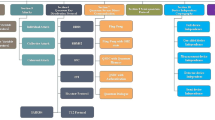Abstract
Multiparty quantum digital signatures play an important role in quantum networks which sign and distribute message among users with information-theoretic security. In this work, we give a cryptanalysis of a multiparty quantum digital signature scheme and then propose a new attacks strategy, whereby dishonest participants can frame an honest participant if they collude with each other. To prevent the framing attack, we study the relations between the signing key and each verification key, as well as the relations among different verification keys in this scheme, and then give the security requirements on the relations among different keys, which is also very useful for the next development of multiparty quantum digital signature schemes. Finally, we present a possible way to solve the security problem.
Similar content being viewed by others
References
Du, H.Z., Wen, Q.Y.: Certificateless proxy multi-signature. Inf. Sci. 276, 21–30 (2014)
Shor, P.: Polynomial-time algorithms for prime factorization and discrete logarithms on a quantum computer. SIAM J. Comput. 26(5), 1484–1509 (1997)
Chaum, D., Roijakkers, S.: Unconditionally-secure digital signatures. In: Advances in Cryptology-Crypto 1990, pp. 206–214. Springer, Berlin (1991)
Hanaoka, G., Shikata, J., Zheng, Y.L., et al.: Unconditionally secure digital signature schemes admitting transferability. In: Advances in Cryptology-Asiacrypt 2000, pp. 130–142. Springer, Berlin (2000)
Ueli, M.M.: Secret key agreement by public discussion from common information. IEEE Trans. Inf. Theory 39, 733–742 (1993)
Clarke, P.J., Collins, R.J., Dunjko, V., et al.: Experimental demonstration of quantum digital signatures using phase-encoded coherent states of light. Nat. Commun. 3, 1174 (2012)
Dunjko, V., Wallden, P., Andersson, E.: Quantum digital signatures without quantum memory. Phys. Rev. Lett. 112, 040502 (2014)
Collins, R.J., Donaldson, R.J., Vedran, D., et al.: Realization of quantum digital signatures without the requirement of quantum memory. Phys. Rev. Lett. 113, 040502 (2014)
Wallden, P., Dunjko, V., Kent, A., et al.: Quantum digital signatures with quantum key distribution components. Phys. Rev. A 91, 042304 (2015)
Wang, T.Y., Cai, X.Q., Ren, Y.L., et al.: Security of quantum digital signatures for classical messages. Sci. Rep. 5, 9231 (2015)
Donaldson, R.J., Collins, R.J., Kleczkowska, K., et al.: Experimental demonstration of kilometer-range quantum digital signatures. Phys. Rev. A 93, 012329 (2016)
Amiri, R., Wallden, P., Kent, A., et al.: Secure quantum signatures using insecure quantum channels. Phys. Rev. A 93, 032325 (2016)
Yin, H.L., Fu, Y., Chen, Z.B.: Practical quantum digital signature. Phys. Rev. A 93, 032316 (2016)
Collins, R.J., Amiri, R., Fujiwara, M., et al.: Experimental transmission of quantum digital signatures over 90 km of installed optical fiber using a differential phase shift quantum key distribution system. Opt. Lett. 41, 4883–4886 (2016)
Puthoor, I.V., Amiri, R., Wallden, P., et al.: Measurement-device-independent quantum digital signatures. Phys. Rev. A 94, 022328 (2016)
Wang, T.Y., Ma, J.F., Cai, X.Q.: The postprocessing of quantum digital signatures. Quant. Inf. Process. 16, 19 (2017)
Yin, H.L., Fu, Y., Liu, H., et al.: Experimental quantum digital signature over 102 km. Phys. Rev. A 95, 032334 (2017)
Yin, H.L., Wang, M.L., Tang, Y.L., et al.: Experimental measurement-device-independent quantum digital signatures over a metropolitan network. Phys. Rev. A 95, 042338 (2017)
Roberts, G.L., Lucamarini, M., Yuan, Z.L., et al.: Experimental measurement-device-independent quantum digital signatures. Nat. Commun. 8, 1098 (2017)
Gottesman, D., Chuang, I.: Quantum digital signatures. arXiv:quant-ph/0105032 (2001)
Arrazola, J.M., Wallden, P., Andersson, E.: Multiparty quantum signature schemes. Quant. Inf. Comput. 6, 0435 (2016)
Gao, F., Qin, S.J., Guo, F.Z., et al.: Cryptanalysis of the arbitrated quantum signature protocols. Phys. Rev. A 84, 022344 (2011)
Sun, H.W., Zhang, L., Zuo, H.J., et al.: Offline arbitrated quantum bind dual-signature protocol with better performance in resisting existential forgery attack. Int. J. Theor. Phys. 57, 2695–2708 (2018)
Fan, L.: A blind signature protocol with exchangeable signature sequence. Int. J. Theor. Phys. 57, 3850–3858 (2018)
Gao, F., Liu, B., Wen, Q.Y., et al.: Flexible quantum private queries based on quantum key distribution. Opt. Exp. 20, 17411 (2012)
Gao, F., Liu, B., Huang, W., et al.: Postprocessing of the oblivious key in quantum private query. IEEE. J. Sel. Top. Quant. 21, 6600111 (2015)
Wei, C.Y., Wang, T.Y., Gao, F.: Practical quantum private query with better performance in resisting joint-measurement attack. Phys. Rev. A 93, 042318 (2016)
Wei, C.Y., Cai, X.Q., Liu, B., et al.: A generic construction of quantum-oblivious-key-transfer-based private query with ideal database security and zero failure. IEEE Trans. Comput. 67(1), 2–8 (2018)
Acknowledgements
We are grateful to the anonymous reviewers for helpful comments. This work was supported by the National Natural Science Foundation of China (Grant Nos. 61602232, 61672110, 61572081, 61671082, 61572246), the Program for Science & Technology Innovation Research Team in Universities of Henan Province (Grant No. 18IRTSTHN014), The key scientific and technological research project of Henan Province (Grant No. 182102310930).
Author information
Authors and Affiliations
Corresponding author
Additional information
Publisher's Note
Springer Nature remains neutral with regard to jurisdictional claims in published maps and institutional affiliations.
Rights and permissions
About this article
Cite this article
Cai, XQ., Wang, TY., Wei, CY. et al. Cryptanalysis of multiparty quantum digital signatures. Quantum Inf Process 18, 252 (2019). https://doi.org/10.1007/s11128-019-2365-8
Received:
Accepted:
Published:
DOI: https://doi.org/10.1007/s11128-019-2365-8



